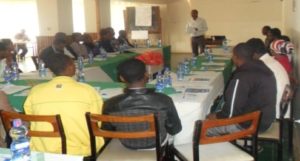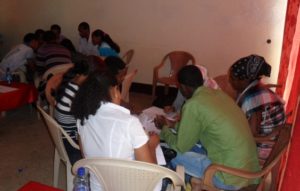
Opening speech by the head of the Hadiya Zone Health Department in SNNP region
In Ethiopia, the Pharmaceutical Fund and Supplies Agency (PFSA), in collaboration with the USAID | DELIVER PROJECT and the SC4CCM project, has been conducting Integrated Pharmaceutical Logistics System (IPLS) training for health extension workers (HEWs) through a combination of group and on the job training (OJT). PFSA, with the support of these projects, is training Primary Health Care Unit (PHCU) directors, HEW supervisors, and pharmacy store keepers to provide training and supportive supervision to the HEWs on the IPLS.
In the second phase of the project, SC4CCM will build on these efforts in 31 facilities to understand what it will take to strengthen the IPLS system between the health center and the health post and fully integrate the ICCM products, which are currently being distributed as kits, into this system to ensure product availability. To launch the second phase, this project and DELIVER conducted one day sensitization workshops in Amhara and SNNP regions with pharmacy staff and directors from health centers, woreda and zonal health offices. The workshops in May 2013 were an opportunity to discuss the activities that had been completed to date and sensitize the phase 2 facilities on the upcoming project activities for strengthening IPLS for HEWS and to explore the current mechanism for distributing ICCM products.

Group discussion in Amhara Region
In addition to the projects explaining their roles in phase 2, the participants also discussed their own roles in strengthening the IPLS for HEWs. They agreed that they should provide OJT and refresher training on IPLS regularly to HEWs and strengthen the linkage between health centers and health posts through monthly PHCU meetings. Supply chain problem solving sessions should be included in the monthly meetings and they should establish a follow-up mechanism to conduct supportive supervision to health posts. They are responsible for resupplying HSAs based on their monthly reporting form and providing feedback reports. Finally, they should find opportunities for experience-sharing among HEWs within and between health centers.
At the end of the workshop, participants created an Action Plan to follow once they returned to their sites. They looked at gaps in training capacity and problem solving that could be completed without the need of project staff. There were approximately one hundred participants between the two workshops.

